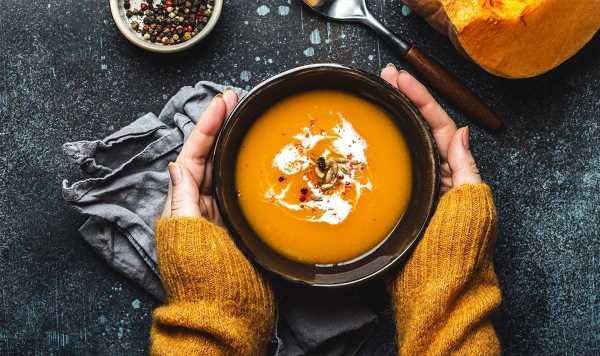Cancer symptoms: Top 14 early signs to look out for
We use your sign-up to provide content in ways you’ve consented to and to improve our understanding of you. This may include adverts from us and 3rd parties based on our understanding. You can unsubscribe at any time. More info
From the warming sensation to affordable ingredients, soup makes for the perfect winter dish. Whether you enjoy hearty chicken with noodles or creamy mushroom, you should wait a few minutes before tucking into your go-to winter warmer. A doctor has warned that enjoying your dish too hot may increase your risk of oesophageal cancer.
With temperatures staying close to zero, many are reaching for hot drinks and foods to keep cosy and warm.
While tucking into your favourite soup might seem like the perfect solution to two problems – hunger and cold, you should watch the temperature of this meal, according to a doctor.
Dr Deborah Lee from Dr Fox Online Pharmacy has warned that slurping this winter warmer when it’s too hot could be taxing on your oesophagus.
Dr Lee said: “Whether eating or drinking foods at high temperatures increases the risk of oesophageal cancer is still uncertain. Studies have had conflicting results.
READ MORE: Dysphonia now a ‘top’ Covid symptom among patients – other signs to look for

“[However,] eating or drinking food and drinks at high temperatures, can cause burns and scalds in the oesophagus, with associated inflammation.
“If this pattern is repeated over many years, it could lead to the production of cancer cells.
“There are no studies on the risks of hot soup and oesophageal cancer. [But] hot soup would likely have the same effects as hot drinks – it’s the temperature rather than the substance itself that’s important.”
What does research say?
While hot soup hasn’t been studied in research, there are various papers linking hot drinks to the deadly condition.
For example, research, published in the journal Clinical Nutrition, warns that hot drinks can almost triple your risk of oesophageal cancer.
Looking at more than 500,000 UK adults, the study focused on people who were more likely to drink coffee and tea.
The study concluded that while more research is necessary, coffee consumption was causally associated with risk of oesophageal cancer, with some evidence reporting that this is related to a temperature effect.
Dr Lee listed another study, looking at this link. She said: “In a 2019 prospective study of Japanese tea drinkers, who were followed up for 10 years, those who drank 700ml or more of very hot tea per day, ≥60°C, had a 90 percent increased risk of squamous cell oesophageal cancer, in comparison to those who drank less than 700ml per day and at 60°C.
READ MORE: More than 50% of cancer patients receiving ‘end-of-life care’ report same five symptoms

“It should be noted that squamous cell oesophageal cancer is more common in Asia, where the incidence of smoking, high alcohol intake, and exposure to environmental pollution is higher.”
Risk factors like smoking and alcohol can also make you more prone to developing oesophageal cancer.
The doctor continued: “In the UK and Europe, a different type of oesophageal cancer, adenocarcinoma is more common and the link between hot drinks and adenocarcinoma of the oesophagus is less clear.”
How to protect yourself
According to gastroenterologists, you shouldn’t eat or drink food or liquids at temperatures of 140°F (60°C) or over.

Dr Lee added: “When you think water boils at 212°F (100°C), this is almost half the temperature of boiling water and is really quite tepid.
“Letting hot drinks or hot food such as soup cool down before eating makes good sense.
“It takes three minutes for boiling water to cool from 212°F (100 °C) to 176°F (80 °C).
“Waiting five or six minutes before tucking into hot drinks or hot soup is probably advisable.
“If you do inadvertently gulp down a hot mouthful, don’t panic. Drink a glass of tepid – not ice cold – water as one hot incident is extremely unlikely to have any serious repercussions.”
Source: Read Full Article
